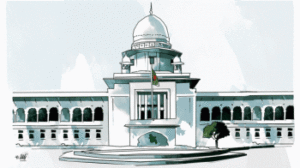
By Ahammad Foyez on Jan 27, 2023
A Bangladesh court ruling recognizing that a mother alone can be her children’s legal guardian is drawing praise from women who cannot identify biological fathers and activists who say it’s a step forward for the Muslim-majority nation of 160 million.
The High Court this week ruled on a petition filed 14 years ago after a regional education board barred a student from sitting for high school exams because her father’s name was not listed on an information form. The student’s single mother raised her by herself in Thakurgaon, a northern district.
Despite the ruling on Tuesday, the lawyer representing the government in the case said its scope was narrow.
“A student can now use the name of their mother or any other legal custodian as their guardian, instead of their father, on any mandatory forms related to high school exams,” Deputy Attorney General Amit Das Gupta told BenarNews.
“The court ruled that if this right wasn’t established, a student could be denied the right to education, undermining a fundamental right enshrined in the constitution,” Gupta said. “The ruling will only be applicable in educational settings, but the full verdict will bring more clarity on the subject.”
In its verdict, the court observed that this type of discrimination was not acceptable anywhere, leading to speculation that there could be more details in the final verdict to be released at an unspecified date.
In 2009, the Bangladesh Legal Aid and Services Trust (BLAST), an advocacy group, and two women’s rights organizations filed a petition with the High Court challenging the education board’s policy. The student involved with the school exams was not identified in the petition.
The petitioners’ attorney, Ainun Nahar Siddiqui, disputed Gupta’s assertion. According to Siddiqui, the ruling would be extended to cover all official forms, including passport applications which previously required the father’s name.
“Because of the constitutional guarantee of equality, one has the right to use either their father’s or mother’s name on any official forms,” Siddiqui told BenarNews, adding that private institutions could adhere to the ruling voluntarily.
BLAST and other plaintiffs also cited the cases of female sex workers, such as Ashrafi Jahan, whose children cannot trace their biological fathers.
Ashrafi Jahan, a sex worker in Dhaka, explained how the ruling helps her family.
“Our children are normally deprived of societal privileges afforded to others. We always wanted our children to receive a normal institutional education, but that was never possible,” Jahan told BenarNews.
“It’s difficult for me to know who my children’s biological father is,” she said. “If the court has issued a verdict that ensures no one would ask our children to reveal their father’s name in schools, it would be a delightful development for us that others cannot even imagine.”
Maleka Banu, secretary general of Bangladesh Mahila Parishad (the Bangladesh Women’s Council), one of the plaintiffs, hailed the ruling as historic.
“In our country, guardianship-related official rules are discriminatory. This verdict could help us rein in that discrimination to some extent,” she said.
The government has not signaled whether it will challenge the verdict before the Supreme Court’s appellate division.
Women in power
Bangladesh, considered a tolerant predominantly Muslim nation, has been ruled for decades by two women, Prime Minister Sheikh Hasina and her arch-rival, Khaleda Zia. Since the early 1990s, when parliamentary democracy was restored, the prime minister and opposition leader in the parliament have always been women.
When Hasina returned to power in 2009, she appointed women to key portfolios in her cabinet such as the interior and foreign ministries. In 2014, when she was reelected, she chose men to run those ministries.
Another woman, Shirin Sharmin Chaudhury, who is the parliament speaker and third highest office holder in the country, could be elected to replace the country’s term-limited president, Md. Abdul Hamid, in next month’s election, according to local media. Nominations are due on Feb. 12 for the election a week later.
On a micro-level, women lag behind in terms of legal rights and opportunities while efforts to elevate them have often proved politically sensitive.
The country is ranked 131st in the Gender Inequality Index by the United Nations Development Program as part of its Human Development Report.
As late as 1998 only fathers were recognized as guardians on school exam registration forms. In 2004 school diplomas started featuring the names of students’ mothers along with their fathers.
In 2011, Hasina’s administration proposed changes to the country’s property inheritance laws – which would have brought women’s rights in line with those enjoyed by men – as part of the National Women Development Policy. The move angered conservative Muslims who protested that it would violate Islamic rules on inheritance recognized by colonial-era domestic laws. The revised and adopted version of the policy did not include those changes.
In subsequent years, the government softened its secular posture in what was seen as a broader trend to reconcile with conservative Islamists, who held considerable influence and appeal.
In 2014, Hasina’s cabinet pushed to lower the minimum age of marriage for girls to 16 in the country that had one of the highest rates of child marriage.
The move drew high-profile international rebukes and some accused the government of trying to placate conservatives following a general election that major opposition parties boycotted.
Hasina forcefully defended the move in the parliament and accused her Western critics of hypocrisy. And a weakened version of the law, which allowed girls to be married off at age of 16 under certain circumstances, was passed in 2017.
